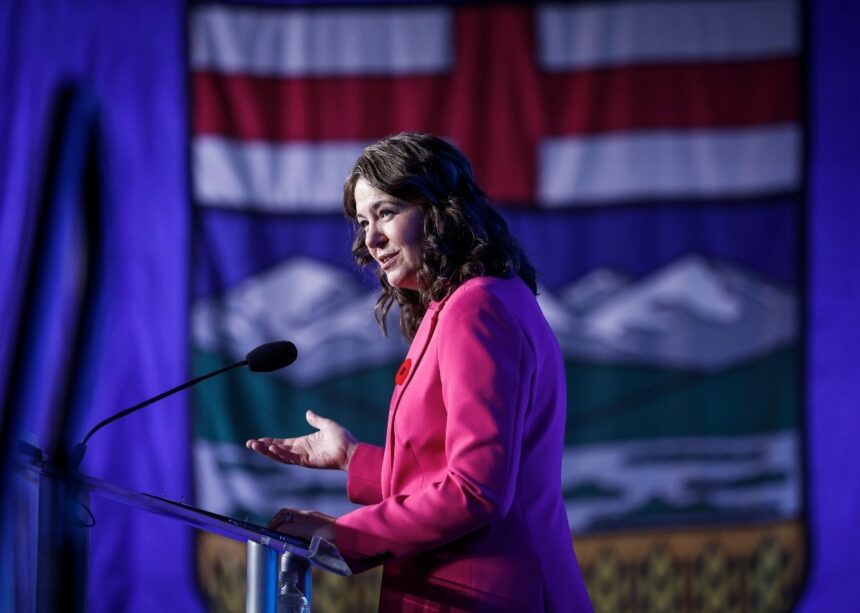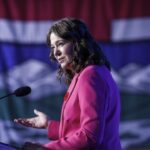I’ve been covering Alberta politics for over a decade now, and the separatist undercurrent has always ebbed and flowed like the Bow River during spring melt. Yesterday’s press conference with Premier Danielle Smith, however, marked what might be a significant turning point in this ongoing narrative.
Standing at the podium in the legislature rotunda, Smith didn’t mince words about the growing frustration she’s witnessing across the province. “The separatist sentiment isn’t just lingering anymore – it’s strengthening,” she told the assembled media, her tone notably more resigned than combative.
As someone who’s followed Smith since her Wildrose days, I found her language particularly telling. This wasn’t campaign rhetoric designed to rally her base. This was a premier acknowledging a political reality that’s becoming increasingly difficult to ignore.
The timing isn’t coincidental. Recent polling from the Alberta Institute shows separatist sentiment has climbed to 32% – the highest it’s been since the 2019 federal election. That’s nearly a third of Albertans who are now open to the idea of independence, up from 25% just eighteen months ago.
“People are tired,” Smith explained, gesturing with a folder of constituent letters her office has received. “They’re tired of feeling like their concerns are secondary to central Canadian interests.”
The federal carbon tax remains the lightning rod for much of this discontent. Despite multiple provincial challenges, including Alberta’s, the Supreme Court has consistently upheld Ottawa’s jurisdiction. Each ruling seems to amplify the sense of western alienation that’s been simmering for generations.
Political scientist Dr. Roger Gibbins from the University of Calgary notes this isn’t just about specific policies. “What we’re seeing is a fundamental question about confederation’s capacity to represent regional interests,” he told me in a phone interview this morning. “Smith is tapping into a genuine frustration, not creating it.”
This tracks with what I’ve been hearing in coffee shops from Red Deer to Medicine Hat. The conversations have shifted from “Ottawa doesn’t understand us” to more pointed questions about whether the current federal structure can ever work for Alberta.
Smith’s UCP government has carefully walked a line between addressing these sentiments and not explicitly endorsing separation. Their Alberta Sovereignty Act, passed in 2022, was designed as a pressure valve – a way to assert provincial autonomy without breaking the confederation.
But yesterday’s comments suggest that pressure continues to build. “We’ve tried working within the system,” Smith said. “We’ve won court cases, we’ve negotiated, we’ve compromised. At some point, Albertans are entitled to ask what they’re getting from this relationship.”
The NDP opposition was quick to criticize Smith’s remarks as irresponsible. Opposition leader Naheed Nenshi released a statement calling them “dangerous rhetoric that threatens economic stability just when we need it most.”
Business leaders I spoke with express similar concerns. Sarah McKenzie, CEO of the Calgary Chamber of Commerce, worries about the economic impact of separation talk. “Investment doesn’t like uncertainty,” she told me. “Every time we ramp up this rhetoric, we see hesitation from outside investors.”
The data partially supports this concern. A recent TD Bank economic forecast noted that political uncertainty was a factor in Alberta’s slightly lower-than-expected capital investment numbers for the first quarter.
Yet for many Albertans, especially those in the energy sector, the economic argument cuts both ways. Travis Langley, a petroleum engineer I met at a diner in downtown Calgary, sees it differently. “We’re already losing investment because of federal policies,” he argued over coffee. “Maybe we’d be better off making our own decisions.”
This sentiment isn’t limited to oil patch workers. Rural communities, hit hard by changing agricultural economics and feeling increasingly disconnected from federal decision-making, form another strong base of separatist sentiment.
Having covered town halls across central Alberta last month, I noticed farm families asking tougher questions about confederation than they were even two years ago. In places like Drumheller and Stettler, concerns about federal agricultural policies have become intertwined with broader sovereignty questions.
Smith knows her political fortunes remain tied to her ability to channel this frustration without letting it overtake her government’s agenda. Her predecessor Jason Kenney tried to contain similar sentiments and ultimately lost his leadership when many supporters felt he wasn’t pushing back hard enough against Ottawa.
Political strategist Janet Brown suggests Smith is making a calculated move. “She’s acknowledging the sentiment without fully embracing it,” Brown explained. “It’s a way of saying to those voters ‘I hear you’ while still maintaining room to govern practically.”
The federal government’s response has been notably muted. When contacted for comment, the Prime Minister’s Office provided only a brief statement reaffirming “the federal government’s commitment to working collaboratively with all provinces.”
That approach may not be sufficient to address the growing divide. Smith hinted that more concrete measures would be required, suggesting that “meaningful constitutional reform” might be the only alternative to growing separatist sentiment.
As I left the legislature yesterday, watching Smith’s staff hurry her to the next appointment, I couldn’t help but think about how much the political landscape has shifted. Ten years ago, separation was a fringe position. Today, it’s being discussed by the premier as a serious political current.
Whether this represents a genuine crisis in confederation or another cycle in Alberta’s complicated relationship with Canada remains to be seen. But one thing seems certain – the conversation isn’t going away anytime soon.







